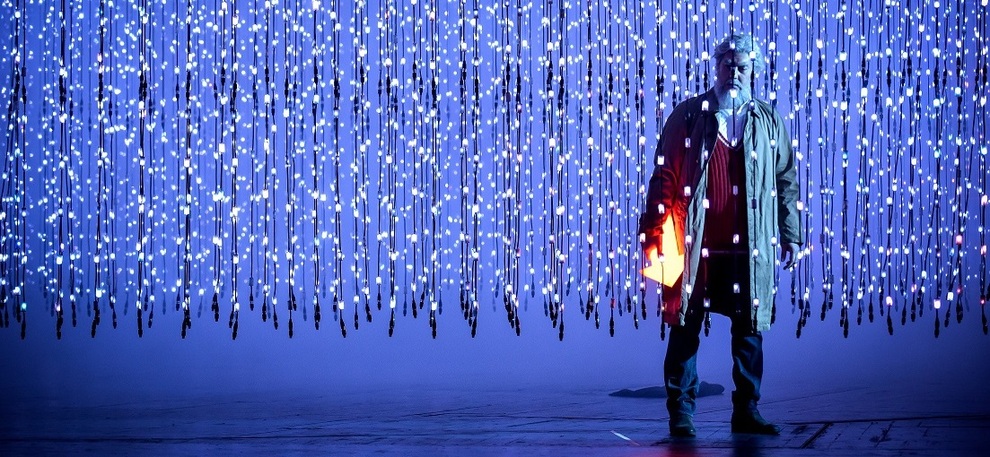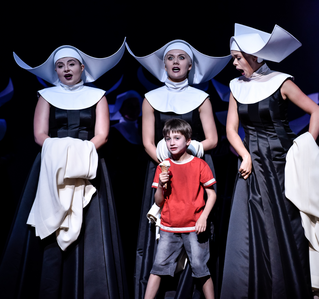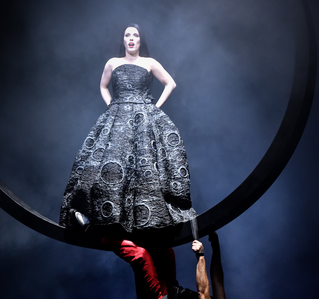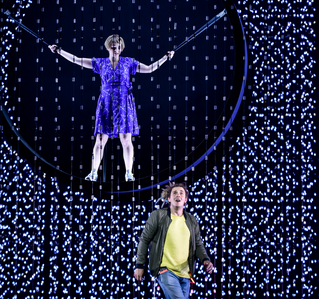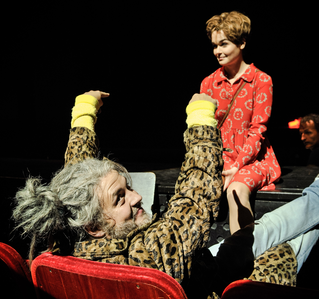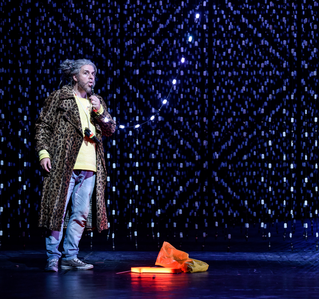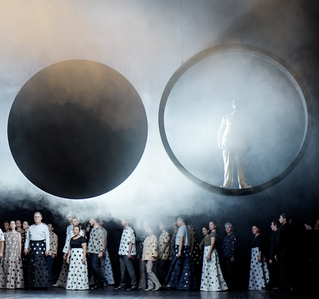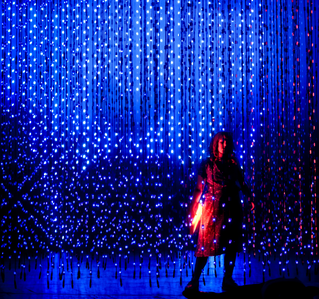So 23.11.2025, 16.30 - 19.30 Uhr | Großes Haus
Wolfgang Amadeus Mozart
Die Zauberflöte
Diese Oper ist ein Theater der Welt: Sie erzählt vom Älterwerden, von Prüfungen, von undurchsichtigen Entscheidungen. Einer ist auf der Suche nach Individualität, manch anderer ist zu bequem dazu. Andere wiederum propagieren, dass die Gemeinschaft der einzig richtige Ort für den Einzelnen sei. Macht ist von alters her legitimiert oder von neuen Machthabern usurpiert. Werte wie Anpassung und Gefolgschaft stehen gegen Selbstbehauptung und Eigenständigkeit. Es wird geliebt und geträumt, getäuscht und vertraut. Selbstmorde werden verhindert, Examina abgenommen, Abenteuer werden bestanden. Wer hat Recht? Wem ist Unrecht geschehen? Die Welt der Zauberflöte ist undurchsichtig, jeder versucht, seinen Weg zu finden: in ihr, aus ihr hinaus oder in sie hinein. Wer steuert das Ganze? Wem ist zu trauen? Der Musik vielleicht?
Inszenierung: Jette Steckel
Bühnenbild: Florian Lösche
Kostüme: Pauline Hüners
Dramaturgie: Johannes Blum, Carl Hegemann
Video: EINS[23].TV (Alexander Bunge)
Licht: Paulus Vogt
Premiere am 23.9.2016
Wir machen darauf aufmerksam, dass in dieser Vorstellung mit Stroboskop-Effekten und teilweise sehr hellem Licht gearbeitet wird.
Eine Pause von ca. 25 Minuten nach dem ersten Aufzug
Altersempfehlung: ab 12 Jahren/Klasse 7
In deutscher Sprache mit deutschen und englischen Übertiteln
Unterstützt durch die Stiftung zur Förderung der Hamburgischen Staatsoper
Tamino und Papageno kennen sich seit Kindertagen. Während Tamino elternlos, doch wohlbehütet aufwächst, muss sich Papageno mit Gelegenheitsjobs durchschlagen. So unterschiedlich sie auch sind, werden sie doch dicke Freunde. Tamino verliebt sich, aber nur in ein Bild von seiner Liebe, denn das Mädchen ist entführt worden. Das berichtet zumindest ihre Mutter. Tamino spürt die Herausforderung. Drei Damen erklären, der Entführer mit Namen Sarastro lebe mit seinen Leuten in einem gutbewachten Gebäude und sei ein dubioser Charakter. Drei kleine Jungs haben den Auftrag, in Notsituationen einzugreifen, und zwei Gegenstände mit geheimer Kraft werden Tamino und Papageno übergeben. Die Rettungsexpedition beginnt.
Kurz bevor sie bei Sarastro ankommen, trennen sich Tamino und Papageno. Während Tamino den offiziellen Vordereingang nehmen will, betritt Papageno das Gebäude durch eine Seitentür und beobachtet, wie Monostatos, ein Sicherheitsangestellter Sarastros, Pamina gefangen hält und sadistisch quält. Papageno gelingt es trotzdem, mit Pamina zu sprechen: Er berichtet vom Plan, sie zu befreien und von Tamino. Es gelingt beiden, ins Freie zu kommen.
Währenddessen wird Tamino klar, dass er es mit einem mächtigen Gegner zu tun hat, die wohlbehütete Welt hat er verlassen, Unbekanntes liegt vor ihm, er muss sich klug und reflektiert verhalten. Mut macht ihm die Gewissheit der Liebe zu Pamina. Er nimmt sich vor, seine Interessen durchzusetzen.
Sarastros Empfangschef befragt Tamino, was er von Sarastro wolle. Tamino sagt, was er von Sarastro hält: Dieser sei ein Tyrann und halte ein Mädchen in seiner Gewalt. Ihm wird geantwortet, dass letzteres zwar stimme, er aber ansonsten eklatanten Fehlinformationen aufgesessen sei. Er wird nicht vorgelassen.
Tamino und Papageno finden sich im Dunkeln wieder. Pamina und Tamino sehen sich zum ersten Mal. Ein Gefühl von Wärme und Zuversicht macht sich unter den dreien breit, doch Monostatos ist hinter ihnen her. Er ruft seine Leute, um die Geflohenen zu verhaften. Doch Papageno aktiviert einen der geheimen Gegenstände, und der Klang, der herausdringt, macht die Angreifer unschädlich.
Da erscheint Sarastro mit großem Pomp. Doch nicht Tamino ergreift das Wort, es ist Pamina, die allen Mut zusammennimmt und freimütig von ihrer Flucht erzählt, aber auch davon, was der Grund dafür war: die Belästigung durch Monostatos. Sarastro bestraft ihn und stellt Pamina in Aussicht, sie werde noch mal froh sein um seine fürsorgliche Entführung. Alles sei ganz anders, als Pamina und Tamino dächten.
Tamino und Papageno sollen einen Sicherheitscheck durchlaufen: Frauen gegenüber sei Zurückhaltung und Vorsicht angesagt. Plötzlich dunkel, kein Weg, keine weiteren Informationen. Bis drei Damen erscheinen, nicht unähnlich den Erzieherinnen Taminos. Ist ihnen zu trauen? Die Mahnung vor „Weibertücken“ war deutlich. Tamino erklärt die Warnungen zum Lügenmanöver. Ob die Damen im Auftrag der Mutter kamen oder Teil der Prüfung ihrer Standhaftigkeit sind, bleibt unklar.
Dass Monostatos von Sarastro bestraft wurde, zahlt er jetzt Pamina heim. Er versucht sie zu vergewaltigen, doch Pamina wehrt sich. Die Klage des Racheschwurs ihrer Mutter steigt in ihr auf, eine Erinnerung aus Kindertagen. Sarastro und die Mutter hatten sich gekannt, waren aber wegen unklarer Besitzverhältnisse in Streit geraten, der kulminierte, als Sarastro das Recht auf Erziehung Paminas beanspruchte. Doch Sarastros Stimme beruhigt Pamina: Rache sei unter seinem Schutz keine Option, das Gute im Menschen sei hier gefragt.
Tamino und Papageno irgendwo in der Einsamkeit. Ihr Weg wird immer trostloser. Am absoluten Tiefpunkt tauchen die drei Jungs auf. Sie ermahnen sie von nun an kein Wort mehr zu sprechen, zu niemandem. Zeit vergeht. Dann Pamina. Sie versteht nicht, warum keiner mit ihr spricht. Tamino ist wie erstarrt, Papageno ist die Situation sichtlich peinlich. Sie können ihr ja nicht sagen, warum sie schweigen.
Sarastro erklärt, Pamina habe nun Abschied zu nehmen, aber nach bestandener letzter Prüfung für Tamino würden sie sich „froh wiedersehen“. Pamina ist so mutlos, verlassen und verzweifelt, dass sie nur das Schlimmste für Tamino annehmen kann, den Tod. Tamino aber folgt unbeirrt Sarastros Anweisungen, ohne wirklich tröstende Worte für Pamina zu finden.
Für Papageno scheint der Weg auch zu Ende, er darf Tamino nicht weiter begleiten. Er lernt ein Mädchen kennen. Er spricht sie an, verdirbt es sich aber sofort wieder, weil er sie gleich küssen will.
Pamina hat alle Zuversicht verlassen, sie will nicht mehr leben. Doch irgendetwas holt sie zurück. Sie kann nicht glauben, dass Tamino sie nicht liebt. Das weiß sie. Sie hat seine Liebe gespürt, und für alles andere wird es eine Erklärung geben. Sie findet ihn an der Schwelle der letzten Prüfung, und obwohl es so nicht vorgesehen war, gehen die beiden zusammen. In diesem Moment wissen sie, dass ihr gesamter langer Weg, auch in Zeiten der Trennung einen Sinn hatte: In diesem Moment der härtesten Prüfung, bestehen sie sie. Die Prüfung ihres Lebens.
Auch Papageno will sich umbringen, auch in ihm regt sich eine innere Stimme: Das Leben hat bestimmt noch was für ihn zu bieten. Und Papagena ist da.
Die Lebensfäden entwirren sich, neue Verhältnisse entstehen, Kinder werden geboren, Schicksale vollenden sich. Und am Ende, wenn die Oper zu Ende ist, präsentieren sich noch einmal in all ihrer Herrlichkeit und Furchtbarkeit die Kräfte und Mächte, die an den Menschen gezerrt haben. Einer aber sitzt in der ersten Reihe und schaut sich diese letzte große Schlussszene an, als ob es sein eigenes Leben gewesen wäre, das auf der Bühne seiner Erinnerung gespielt wurde.

